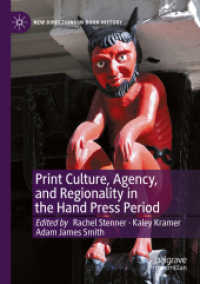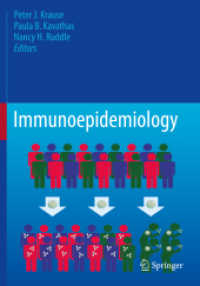Full Description
How Does Foster Care Work? is an international collection of empirical studies on the outcomes of children in foster care. Drawing on research and perspectives from leading international figures in children's services across the developed world, the book provides an evidence base for programme planning, policy and practice.
This volume establishes a platform for comparison of international systems, trends and outcomes in foster care today. Each contributor provides a commentary on one other chapter to highlight the global significance of issues affecting children and young people in care. Each chapter offers new ideas about how foster care could be financed, delivered or studied in order to become more effective.
This book is important reading for anyone involved in delivering child welfare services, such as administrators, practitioners, researchers, policy makers, children's advocates, academics and students.
Contents
Part 1. Introduction. Foreword. James K. Whittaker, University of Washington, USA. Introduction: Reviewing International Evidence to Inform Foster Care Policy and Practice. Elizabeth Fernandez, University of New South Wales, Australia and Richard P. Barth, University of Maryland, USA. 1. International Perspectives on Foster Care. June Thoburn, University of East Anglia, UK. Part 2. Placement Movements and Destinations. 2. Five Year Developmental Outcomes for Young Children Remaining in Foster Care, Returned Home or Adopted. Richard P. Barth and Christopher Lloyd, University of Arkansas, USA. 3. The Placement Stability in Foster Care. Fred Wulczyn and Lijun Chen, University of Chicago, USA. 4. Foster Care in the Netherlands: Correlates of Placement Breakdown and Successful Placement. Johan Piet Strijker, University of Groningen, The Netherlands. 5. Profile and Scope of Foster Care in Spain. Jorge Fernandez del Valle and Mónica López, University of Oviedo, Spain. 6. Reunification in Australia: Insights from South Australia and New South Wales. Elizabeth Fernandez and Paul Delfabbro, University of Adelaide, Australia Part 3. The Foster Care Experience: A Life Course Perspective. 7. Very Young Children in Care in England: Issues for Foster Care. Harriet Ward and Emily R. Munro, Loughborough University, UK 8. Fostering Adolescents in England: What Contributes to Success? Elaine Farmer, University of Bristol, UK. 9. Rates of Mental, Emotional, and Behavioural Disorders Among Alumni of Family Foster Care in the United States: The Casey National Alumni Study. Peter J. Pecora, Catherine Roller White, Lee Ann Murdock, Kirk O'Brien, Casey Family Programs, USA, Ronald C. Kessler, Nancy Sampson and Irving Hwang Harvard Medical School, USA. Part 4. Psychological Outcomes and Correlates of Outcomes. 10. What Makes for Effective Foster Care: Some Issues. Ian Sinclair, University of York, UK. 11. Long-term Outcomes of Foster Care: Lessons from Swedish National Cohort Studies. Bo Vinnerljung, University of Stockholm, Sweden, Eva Franzén, Swedish Ministry of Health and Social Affairs, Sweden, Anders Hjern, National Board of Health and Welfare, Sweden and Frank Lindblad, Uppsala University, Sweden. 12. Foster Care in Denmark: Comparing Kinship and Non-Kinship Forms of Care. Lajla Knudsen, Tim Egelund and Anne-Dorthe Hestbæck, SFI, The Danish National Centre for Social Research, Denmark. 13. Selected Educational Outcomes for Young People Aged 17-19 Years in Long Term Foster Care in Ireland. Fiona Daly, Irish Association of Young People in Care, Ireland and Robbie Gilligan, Trinity College Dublin, Ireland. 14. Can Tutoring by Foster Parents Improve Foster Children's Basic Academic Skills? A Canadian Randomized Field Trial. Robert J. Flynn, Marie-Pierre Paquet and Robyn Marquis, University of Ottawa, Canada. 15. Wellbeing in Foster Care: An Australian Longitudinal Study of Outcomes. Elizabeth Fernandez. Commentary by Robert Flynn. Conclusion. Richard P. Barth and Elizabeth Fernandez. List of Contributors. Index.








